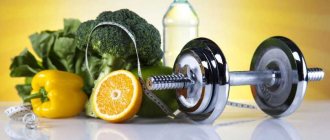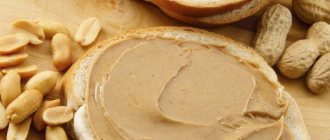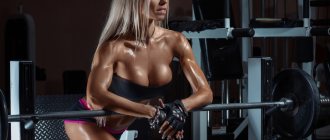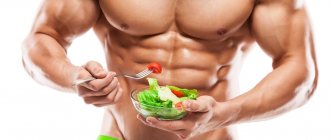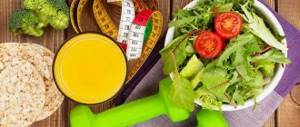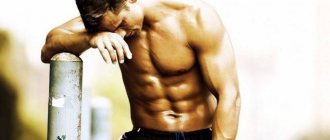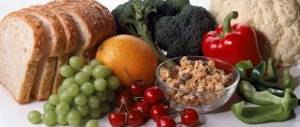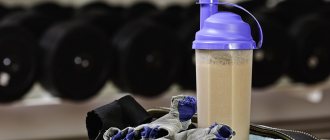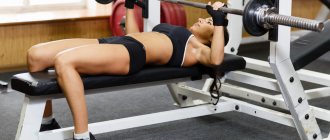In recent years, leading a healthy and active lifestyle has become increasingly popular among young people, and not only others, which, without a doubt, is extremely good in itself. However, rushing from one extreme to another, many people who succumb to the mainstream forget that during intense sports, for example, when pumping muscles, it is absolutely necessary to provide a balanced and proper diet for your body, otherwise you may not only not achieve the expected result, but even harm your own health.
Since such an item should never be included in plans for the coming years, it is worth seriously thinking about what you can eat after training, before it, and also before going to bed, because all these are extremely important issues that need to be thought through in advance.
Post-workout nutrition to gain muscle mass: basic rules
The main mistake of most novice athletes is the lack of a balanced diet to maintain the balance of nutrients in the body.
There is no point in heavy physical activity if there are no foods rich in protein, carbohydrates and fats in the diet.
Rules for steadily building mass and strengthening tendons:
- You should eat at least 6 times a day (instead of three). The break between doses can be up to 3 hours.
- The diet should be designed in such a way that the calorie content of food per day exceeds the body's expenses. The body will use excess calories to build muscle tissue.
- Fats are necessary, but in limited quantities. It is advisable to exclude products based on fast carbohydrates from the diet.
- Switching to a purely protein diet will only harm the body. The ideal menu contains proteins, fats and carbohydrates. The share of high-protein foods should be at least 60% of the total calorie content.
- Daily fluid intake is at least 2.5 liters. Water obtained from food is also taken into account, but its amount is insignificant.
- The main amount of food should be eaten before 6 pm. Next, light snacks are acceptable. The calorie content and weight of each meal should be approximately the same.
Be sure to read: Protein for girls to gain muscle mass: which one is better, how to choose, how to drink
Foods that promote muscle gain
- Eggs or egg whites. Chicken eggs are the most useful for consumption. Of course, when boiled, their calorie content increases greatly, but without this the product is less digestible. Eggs are an excellent source of protein, iron, phosphorus, and thanks to this particular combination of elements, damaged muscles return to normal faster after training. However, nutritionists do not recommend eating more than ten eggs a week due to their high cholesterol content.
- Fish and seafood. Athletes are advised to eat mackerel, sardines, salmon, tuna, mussels, shrimp and squid. And at least three times a week! The fact is that fish and seafood contain omega-3 unsaturated fatty acids and vitamin E, the consumption of which reduces the risk of muscle injury. And this is very important for those who play sports professionally.
- Dairy products. The most popular among athletes from this group of products are low-fat cottage cheese and ricotta cheese. Cottage cheese is an irreplaceable source of slow protein that promotes rapid muscle growth. Ricotta has almost the same properties as this fermented milk product, and also increases the body's endurance.
- Meat. The most suitable types for athletes are chicken, rabbit, veal and turkey. They contain large amounts of protein, collagen and elastin, which are necessary for strengthening muscles and joints.
- Whole wheat bread. Contains slow carbohydrates necessary for gaining muscle mass. For a snack, you can choose bread with the addition of wheat, legumes and seeds.
- Nuts. This is a whole storehouse of various useful substances. They contain many vitamins, quickly satisfy hunger and are also ideal for quick reinforcement.
- Fruits and vegetables. They are a good source of energy and all necessary microelements. Athletes are advised to eat bananas, strawberries, pineapple, kiwi, citrus fruits, potatoes, broccoli, asparagus and spinach. Nutritionists especially highlight potatoes on this list. It is believed that a small portion of it will not harm your figure, and the carbohydrates included in the composition will quickly make up for the energy deficit spent on physical exercise.
- Various cereals. After your workout, you can snack on a small portion of Grade A pasta. It is also a good source of carbohydrates. But eating them is often not recommended, since they are quite high in calories and instead of muscle mass, there is a risk of building up unnecessary fat deposits. Brown rice is very useful for post-workout nutrition. It contains a hormone that helps increase muscle mass. It is also recommended to consume buckwheat and oatmeal.
- Sweets. Sometimes even athletes want them so much! It is best for them to eat chocolate with at least 85% cocoa content, light-colored marshmallows and marshmallows.
- Beverages. Nutritionists advise drinking freshly squeezed juices (preferably cherry) and mate tea after intense exercise. Cherry juice helps to quickly restore the body after training; it has powerful antioxidant and anti-inflammatory effects. Mate tea or Paraguayan tea gives strength and energy.
All of the above foods and drinks must be included in your diet, both individually and as part of various dishes, if you want to quickly gain muscle mass. And don't forget to drink at least two liters of still water a day! Probably, no one needs to explain the benefits of consumed liquid to the body.
You will also learn how to eat properly before and after training from these videos:
What foods should you not eat?
As a rule, after intense physical activity, a strong appetite awakens. But you shouldn’t follow his lead and eat everything if you want to have a beautiful and slender body. At the very least, avoid the following foods:
- sweets that contain a lot of preservatives, additives and sugar;
- fast food, which contains a lot of “chemicals”;
- fatty meats, sausages and smoked meats;
- salted, fried, spicy dishes and marinades;
- beer. It promotes excess fat deposits and contains hormones.
It also happens that you eat all the listed foods, train, but muscle mass does not grow. This suggests that you are making a number of mistakes. For example, you don’t get enough rest and sleep, you don’t drink enough fluids, you don’t follow a proper diet, you exercise on an empty stomach, and you experience frequent stress. It also happens, on the contrary, that you go to the gym too little or erratically, do not change your training program, or eat a lot of high-calorie foods.
Strictly follow all the instructions of nutritionists and the sports program and then you are guaranteed a beautiful body!
How long after training should you eat?
During exercise, the body consumes useful substances; to restore old tissues and create new ones, an increased amount of useful substances is required.
The main condition for the effectiveness of post-workout nutrition is to be in time for the “anabolic” window. Within about 20 minutes after the end of strength training, the body is ready to absorb nutrients at double the speed and benefit.
It is best to eat curd products, eggs, beans, and not fatty foods, since all the fat received will be used by the body to build a fat layer.
You can use protein powder to make a protein shake. A source of sufficient carbohydrates is bread or pasta.
Fat cannot be completely excluded from the menu, but its content should not exceed 3 g.
All types of fried foods should be excluded from the post-workout diet; yoghurts and dairy drinks should contain a minimum amount of fat. Of the meat products, chicken breasts are the most valuable due to their minimal fat and carbohydrate content.
Beef and pork should be excluded from this meal due to their high fat content.
Although the athlete feels pain and fatigue, after training the body is in the excitation phase for at least another 1 hour. At this time, products containing tonic additives (energy drinks, coffee and tea) are prohibited for consumption.
Myth 2. Post-workout nutrition depends on gender and body type.
Theory. All people are different.
For example, a woman who wants to gain muscle and burn fat does not have the same nutritional needs as a man who is building muscle mass. Scientific data. Post-workout nutrition recommendations may depend on the type and frequency of training, but not on body type or gender. Additionally, regardless of your total daily calorie intake, eating large amounts of carbohydrates after exercise will not provide any real benefit. In other words, anyone, male or female, who is heavier may need more calories than someone who weighs less, but it is not necessary to meet these needs immediately after exercise.
E. Glyn's research into the role muscle protein breakdown plays in the protein anabolic response to essential amino acids and carbohydrates after resistance exercise shows that there is no difference between consuming 30 and 90 grams of carbohydrates in addition to essential amino acids. Both 30 and 90 grams significantly reduce breakdown and increase muscle protein synthesis. If insulin is within the normal range, that is, it is not high or low, its surge does not provide any benefits compared to a gradual increase in its level. Therefore, for the same training programs and goals, similar nutritional recommendations apply.
What to eat after training for muscle growth
Your post-workout meal should include a protein shake or egg whites. This is a great way to quickly deliver protein to hungry muscles.
The main thing is to avoid fatty foods. If you want meat after class, then it is better to choose chicken breast rather than drumsticks or wings. Chicken skin is excluded from the diet for any type of preparation (boiled, fried). It is undesirable to consume meat by-products (pork/beef ears, chicken hearts, etc.).
Be sure to read: Which creatine is better: rating of the most effective, how to choose, the best
Carbohydrates as a source of energy after exercise
Glycogen is a key substance necessary for muscle function. During training, its reserves are spent, and after it it is necessary to quickly restore them. The best way is to consume fast carbohydrates immediately after exercise (in the locker room).
The rate of absorption of a product is determined by its glycemic index.
Of course, chocolate bars and cakes look tempting, but eating them causes a sharp increase in blood sugar levels, which is harmful to health. But boiled potatoes, muesli and white bread toast are perfect.
Proteins for muscle fiber recovery
Protein is the basis for building muscles.
To speed up recovery, the diet includes the following foods:
- fish (tuna, cod);
- chicken meat (breast part), lamb (thigh), beef and pork pulp;
- Dairy products include cheeses and cottage cheese (low-fat);
- boiled eggs (whites only, no yolk needed);
- beans and nuts.
The rest of the products either do not have enough protein or contain a lot of fat.
Proper nutrition before training
If you eat a heavy meal before exercise, you will find it difficult to perform the exercises. Therefore, in order not to overload yourself and at the same time not to feel hungry during training, it is best to eat 30-60 minutes before training. However, the portion should be small.
While your metabolic rate and body composition will help you determine the exact amount of nutrients you need, you'll still want to eat something before your workout. Ideally, this meal should contain equal amounts of quickly digestible carbohydrates and protein to better nourish your muscles, as well as their growth and rapid recovery.
Starchy carbohydrates, such as bagels or white rice, and other fast-digesting sugars - sugar, glucose, maltodextrin - along with fast-digesting proteins, such as whey protein or egg whites, are quickly absorbed by the body during intense training.
Additionally, immediately after your workout, your muscles will be exhausted and you will need to replenish your glycogen levels, which helps your muscles contract better.
In order to replenish nutrients after a workout and kickstart the growth process (anabolism), you again need to consume quickly digestible carbohydrates. It's the same here, fast-digesting proteins like whey protein can quickly move through muscle cells along with sugar molecules.
Research has shown that after strength training, you need much more dietary protein than those who lead a sedentary lifestyle. Plus, eating fast-digesting protein before and after your workouts will give you even more benefits and promote rapid muscle growth.
“For even more muscle growth, consume protein before and after your workout.”
Research has shown that you can increase protein synthesis immediately after exercise by consuming fast-absorbing protein to maximize muscle mass and strength development. Simply put, immediately after a hard workout, your muscles need nutrients and food containing quickly digestible proteins and simple carbohydrates for better muscle growth.
Many athletes prefer to consume these nutrients in liquid form (along with a protein shake) because they are easier to prepare and easier to digest than solid foods.
Considering that food typically takes a long time to prepare and digest, this may not be the best choice for a post-workout snack. It is better to eat heavy food an hour or two after training.
What foods to avoid?
The right diet is the key to success in building the body of your dreams.
The list of prohibited foods for all athletes is as follows:
- products of the sausage industry (sausages, slices);
- chips, crackers, semi-finished products;
- products of non-natural origin (black ice cream, watermelon-flavored water, etc.).
These foods should be excluded from the diet. If they are your constant companions, start gradually giving them up. This will slow down your training progress, but will make it easier to give up bad habits.
Post-workout food for muscle growth: 10 foods
Basic products for balanced nutrition of the body:
- still drinking water;
- egg white (yolk is discarded);
- fatty fish (in moderation) to saturate the body with Omega-6 and Omega-3;
- buckwheat (contains a large amount of amino acids);
- almonds (to replenish vitamin E reserves);
- dairy products before bed (cottage cheese, yogurt and milk);
- flaxseed or olive oil;
- green beans;
- protein supplements as a source of pure protein;
- fruits and vegetables to supply the body with all groups of vitamins.
Be sure to read: Which is better and how to take brewer's yeast for weight gain, what is useful for women and men
